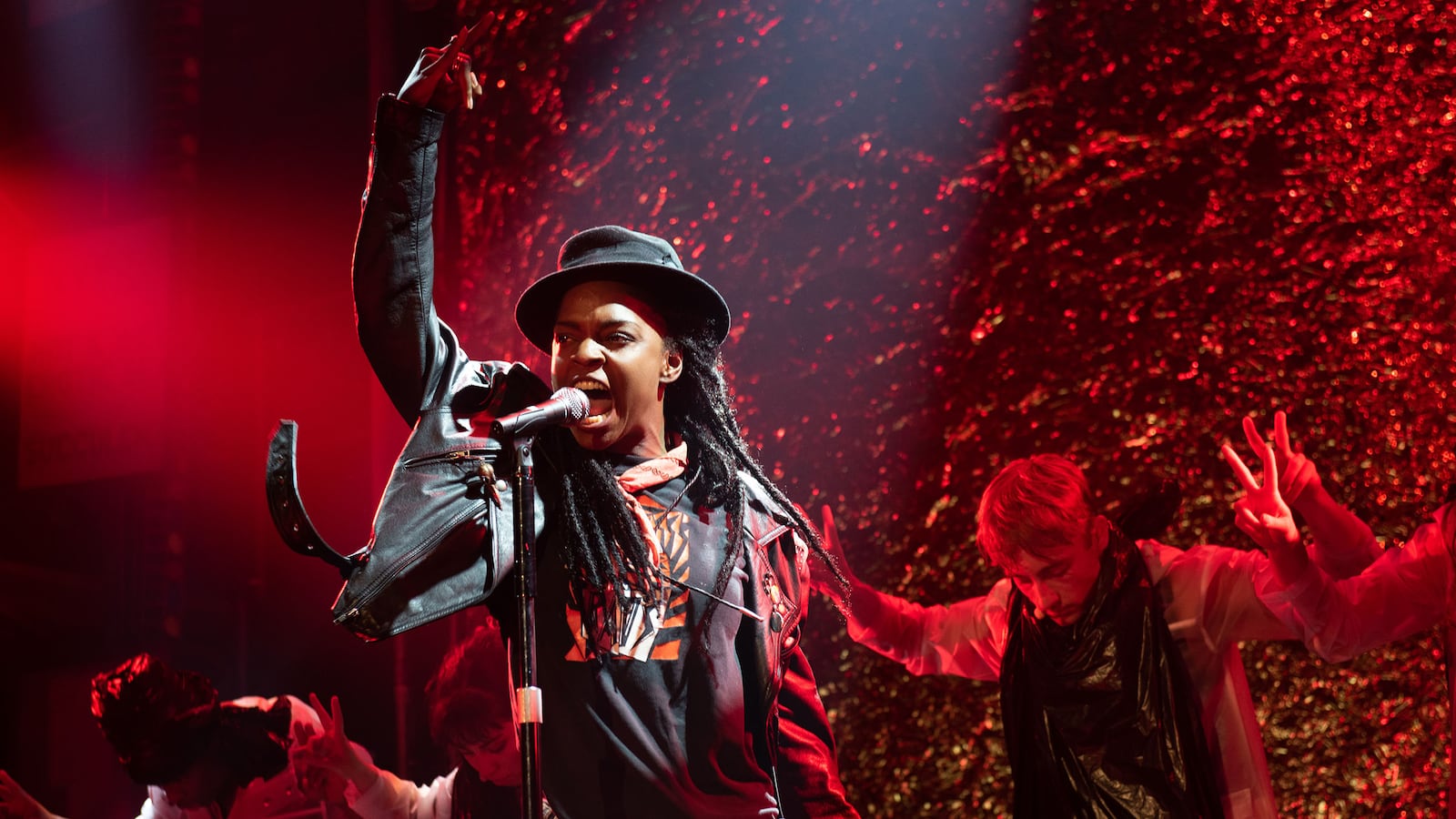There should be a moratorium on Studio 54, or some kind of committee that vets all cultural output inspired by it.
Sure, it was fun, or looks like fun, and yes, I’m sure Andy and Liza had such a blast there, and Bianca on the white horse was everything, blahdiblah. But think before you go to the trouble of designing another Studio 54 man-in-the-moon. Writers and producers, please ask yourselves: What else new is there to say about it?
And if you haven’t got anything new to say about it, is there any need to say anything at all?
We know simply everyone did cocaine there. Truly, we don’t need any more scenes of people doing cocaine at Studio 54. It would be a thousand times more radical if a director showed people having a conversation over their drinks.
The self-advertised “rock opera” This Ain’t No Disco, which opened at the Atlantic Theater on Tuesday, has some standout creative muscle. Its music and lyrics and book are by Stephen Trask and Peter Yanowitz; Trask was responsible for the music and lyrics of Hedwig and the Angry Inch. The director, Darko Tresnjak, last year helmed Anastasia on Broadway (which I, sappily, loved).
This Ain’t No Disco is supposedly set in 1979/1980, and everything about it is familiar and well-trodden. Simply everyone wants to get in to Studio 54, don’t you know (the chorus of dancers clamors to be, which becomes grating), and once inside the drinks and drugs flow freely.
We meet the down-on-her-luck single mom singer, Sammy (Samantha Marie Ware, excellent) and Chad, the cute, simple kid from outta town (Peter LaPrade). The first puzzling thing is that Sammy describes herself as a punk. I’m a British kid of the 1970s. Sammy is dressed nothing like a punk.
Then Studio 54’s co-founder Steve Rubell appears; Ian Schrager is absent, possibly because he is still alive and could sue. As played by Theo Stockman, Rubell is portrayed as a bug-eyed, creepy sleazeball for the duration of the show. We are also supposed to buy that he is a radical, hedonistic genius.
His first song, featuring Chad in high-cut shorts sitting on his knee, is a weird, not-sexy-in-any-way ode to young flesh. When he sings at us all about the glittering joys of Studio 54, he looks more louche loser than nightclub super-inventor.
The musical thinks its skin-showing, arch, bitchy brashness is its most winning quality. But the two artists running the cloakroom—Meesh (Krystina Alabado) and Landa (Lulu Fall)—are like any struggling downtown artists you’ve ever seen in a movie or play, creating their not-that-crazy-actually installation art.
Possibly the most insulting non-engagement with transgender characters I have ever seen on stage or screen occurs when, in a throwaway lyric, one of these characters announces they are transgender.
The musical also flirts, by rote, with wanting to be a star (Chad becomes a graffiti sensation called Rake), wanting to make it, not making it, fame, losing fame, genuine talent, fake talent, child abuse trauma, slimming pill addiction…
Then there’s the DA (Trevor McQueen) out to bring down Rubell for his IRS misdemeanors. Chilina Kennedy as PR flak-turned-cable news harridan Binky supplies the most pep on stage, but even even her big-haired campy pantomime wears thin. The music is well-executed, but not memorable.
Why is the character who looks very much like Andy Warhol, right down to the shimmering, feathery crown of hair, called The Artist? Is there a copyright issue? Actor Will Connolly’s presence is plausibly ghostly and glacial, until his powerful closing solo song.
The musical is distinguished, even saved from total dud territory, by the wonderful voice of Ware, and the passion and energy of the company. Her performance, and the depth she brings to her character’s bonkers story arc, is almost too big for the Atlantic stage—very welcome that it is.
The multi-level set is complicated and fussy but at least a paradise for nostalgists, featuring posters and signs projected on walls and ceiling for famous clubs and venues of yore and strip joints; a Chambers Street subway sign is coated in plausible dirt.
But this riot of diverting design detail sadly doesn’t save This Ain’t No Disco from being a derivative and predictable trip down memory lane. Please, producers: Approach Studio 54 with caution.
This Ain’t No Disco is at the Atlantic Theater Company, Linda Gross Theater, 336 West 20th Street, New York City, until Aug. 12. Book here.





